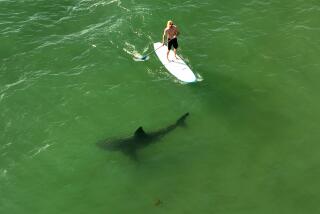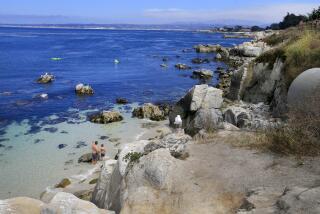Panel Delays Action on Ocean Tests : Environment: Coastal Commission decides to vote on undersea sound experiment when a hearing can be held close to where the tests would be located. Researchers say the decision jeopardizes the project.
Heeding the pleas of environmentalists and animal lovers, the state Coastal Commission voted Wednesday to delay approval of an undersea sound experiment off Northern California.
By a vote of 10 to 0, the commissioners agreed that they should not consider the project until they meet next month in Carmel so they can hear from people who live near the area that would be affected by the noisy deep-sea broadcasts.
“To do this 350 miles away is just not good public policy for this commission,” said John Hisserich, a commissioner from Monterey.
Researchers with Scripps Institution of Oceanography protested that the delay would throw off their timetable, jeopardize Defense Department funding for the project and endanger studies planned for this summer to see how whales react to the noise.
“The delay is really a matter of life and death for the project,” oceanographer Walter Munk told the commission before the vote. “If you delay now, there is an avalanche of further delays.”
The researchers are seeking state and federal permission to study global warming by repeatedly transmitting a 195-decibel rumble in waters 55 miles off Half Moon Bay in San Mateo County.
The sound waves, which could be detected as far as the waters off New Zealand, would allow oceanographers to measure minute increases in the Pacific Ocean’s temperature over the next decade.
Before they can begin, they need the Coastal Commission’s determination that the project will not unduly harm coastal resources and its permission to lay a power cable through state waters.
Critics, including citizen activists and the Natural Resources Defense Council, argue that the sound waves could harm or disturb whales, elephant seals and other sea creatures that pass through the test area.
So far, the opposition has succeeded in delaying the project for more than a year to give researchers time to conduct a detailed environmental assessment of the experiment’s effect on marine animals. But when the study was completed May 1, Scripps pushed for quick Coastal Commission approval.
To mute the criticism, scientists agreed this year to move the site of their underwater loudspeaker from a federal marine sanctuary off Big Sur to the more remote Pioneer Seamount off Half Moon Bay.
The oceanographers also promised to spend the first six months of their two-year experiment studying the effect of the noise on sea creatures.
But opponents say the changes are not sufficient. They want the scientists to study the effect of the broadcasts on marine animals--no matter how long it takes--before starting the temperature measurements.
Members of the Coastal Commission warned the Scripps researchers that they could face even greater delays through lawsuits if they do not attempt to work out a compromise with critics and ensure that the public has ample opportunity to comment.
“This is not an ordinary land-use project,” Commissioner Sam Karas of Monterey said in urging his colleagues to delay a decision. “We’re talking about something with world significance.”
Rabin reported from Huntington Beach; Paddock reported from San Francisco.
More to Read
Start your day right
Sign up for Essential California for news, features and recommendations from the L.A. Times and beyond in your inbox six days a week.
You may occasionally receive promotional content from the Los Angeles Times.





